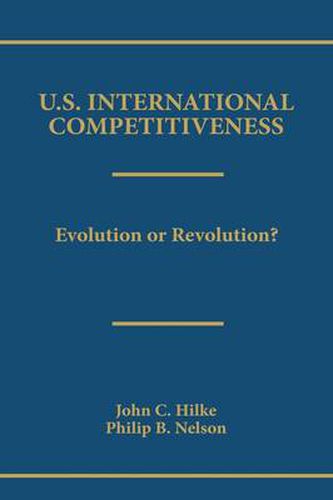Readings Newsletter
Become a Readings Member to make your shopping experience even easier.
Sign in or sign up for free!
You’re not far away from qualifying for FREE standard shipping within Australia
You’ve qualified for FREE standard shipping within Australia
The cart is loading…






U.S. International Competitiveness challenges the common assertions concerning causes of America’s growing trade deficit. The authors’ unique empirical analysis of industry specific trade flows using numerous explanatory variables provides a vigorous test of the view that deficit growth is primarily due to unfair foreign trade practices, overzealous antitrust laws, slack U.S. management, and other microeconomic factors. Their conclusions on the actual culprits offer a sobering reassessment of current and proposed trade policies. American and foreign public policy makers, as well as trade and industrial organization scholars, will find this volume to be enlightening and provocative reading.
The first two chapters establish the parameters and theoretical background for the study. The authors then review the microeconomic explanations for sudden trade deficit growth, identify industry characteristics included in the study, and specify the model to be tested. Turning to an examination of the empirical results, they initially look at whether changes in industry characteristics over time could have increased the deficit. They then highlight microeconomic explanations for changes in the U.S. trade balance. Concluding chapters present detailed case studies of particular industries as well as the policy implications to be drawn from the study.
$9.00 standard shipping within Australia
FREE standard shipping within Australia for orders over $100.00
Express & International shipping calculated at checkout
U.S. International Competitiveness challenges the common assertions concerning causes of America’s growing trade deficit. The authors’ unique empirical analysis of industry specific trade flows using numerous explanatory variables provides a vigorous test of the view that deficit growth is primarily due to unfair foreign trade practices, overzealous antitrust laws, slack U.S. management, and other microeconomic factors. Their conclusions on the actual culprits offer a sobering reassessment of current and proposed trade policies. American and foreign public policy makers, as well as trade and industrial organization scholars, will find this volume to be enlightening and provocative reading.
The first two chapters establish the parameters and theoretical background for the study. The authors then review the microeconomic explanations for sudden trade deficit growth, identify industry characteristics included in the study, and specify the model to be tested. Turning to an examination of the empirical results, they initially look at whether changes in industry characteristics over time could have increased the deficit. They then highlight microeconomic explanations for changes in the U.S. trade balance. Concluding chapters present detailed case studies of particular industries as well as the policy implications to be drawn from the study.